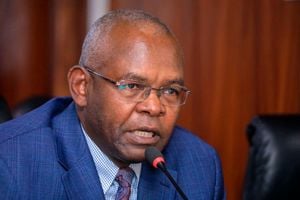Breaking News: Ruto postpones school reopening indefinitely due to flooding

The Central Bank of Kenya headquarters in Nairobi.
The Central Bank of Kenya (CBK) has opened access to its new electronic forex trading platform to non-bank actors, paving the way for large dollar holders to sell their stock to the highest bidder in an open market.
According to rules published by the CBK on the new platform, which is known as Electronic Matching Systems (EMS), non-bank system participants will be limited to only selling forex on the platform, meaning that purchases will still have to be made via their commercial bankers.
Additionally, the vendors will, however, not be allowed to influence the exchange rate through display of two-way prices like commercial banks. They are also required to adhere to strict standards to prevent market disruption.
“(They) should perform “know-your-customer” (KYC) checks on their counterparties to ascertain that their transactions are not used to facilitate money laundering, terrorist financing, or other criminal activities.”
The introduction of the electronic platform is part of reforms that the CBK has been rolling out to improve the functioning of the forex market, which was last year hobbled by hard currency supply problems despite Kenyans holding billions of dollars in local bank accounts.
The direct sales on the platform, dealers say, can unlock supply to smaller banks that are struggling to access dollars in the formal interbank market.
By the end of October 2023, latest data from CBK shows, Kenyans held a record Sh1.45 trillion worth of hard currencies in local bank accounts, which represented a 61 percent increase from the Sh899.7 billion worth of dollars held a year earlier.
Corporates account for about 70 percent of Kenya’s dollar deposits, with the rest in the hands of households, indicating that the bulk is not held for speculative purposes.
Exporters in sectors such as tea, horticulture and manufacturing, and players in the tourism sector are some of the large holders of dollars in the economy.
The CBK has also lowered the minimum transaction amount for interbank forex trades to $100,000 (Sh15.7 million), with additional lot sizes of $50,000 for deals carried out on the EMS platform, effectively improving the liquidity in the market.
The rules are, however, not clear on whether these limits apply to the non-bank participants.
Previously, the minimum limit had been set at $500,000 (Sh78.7 million), before being lowered to $250,000 (Sh39.3 million) in August last year.
The regulator has also removed the requirement limiting the spread of 20 cents between bids and asks, effectively freeing market participants to negotiate rates depending on supply and demand.
In order to guarantee liquidity and fair prices in the market, the CBK has earmarked the 10 leading commercial banks in terms of foreign exchange trading to act as market makers for the platform.







